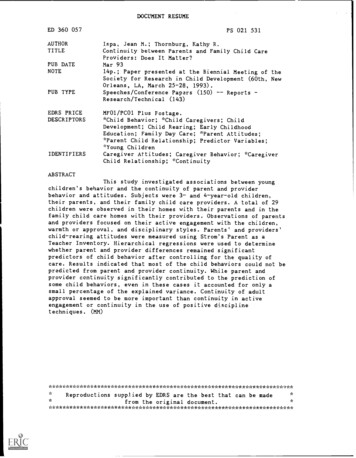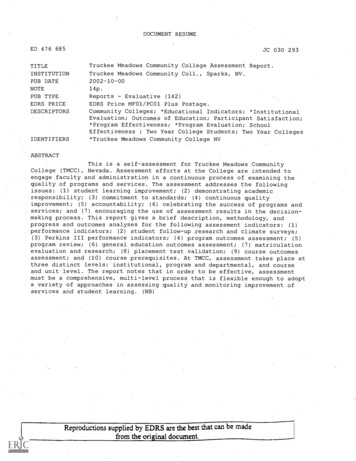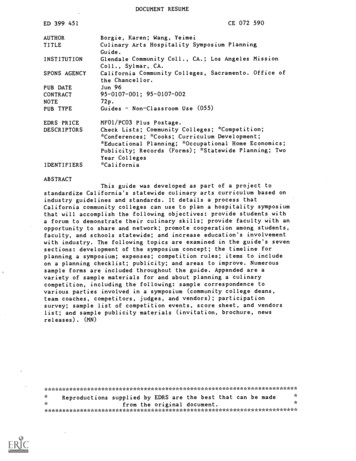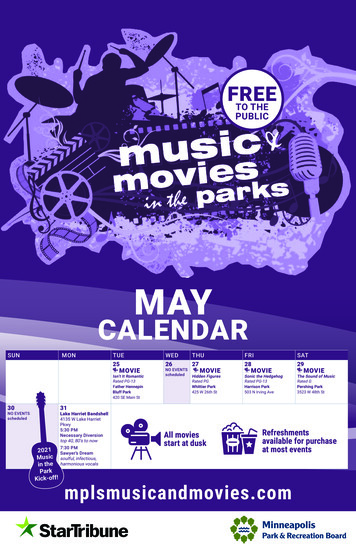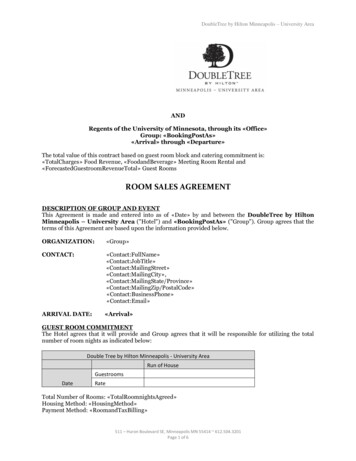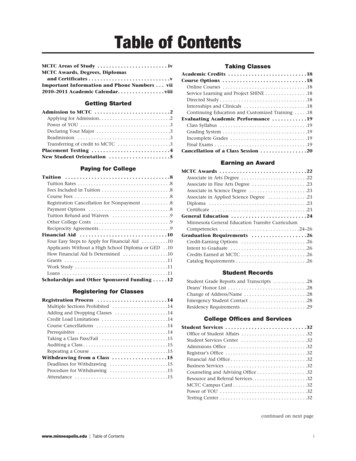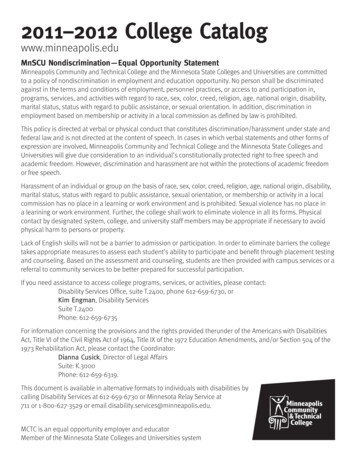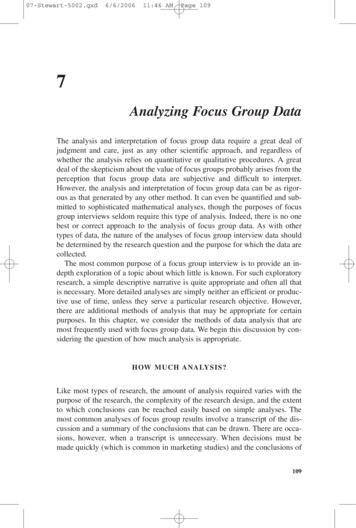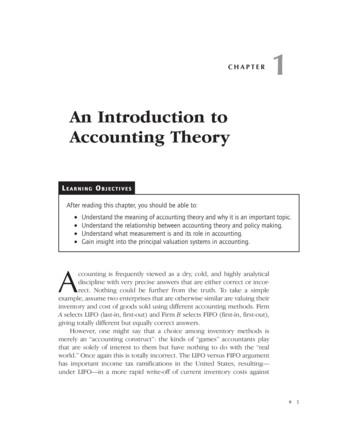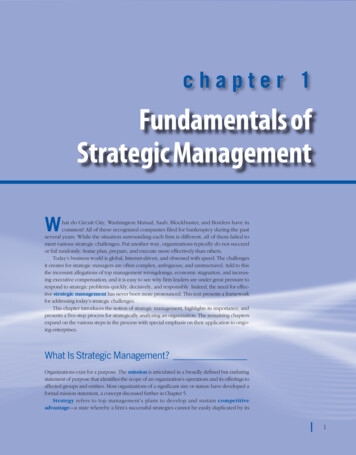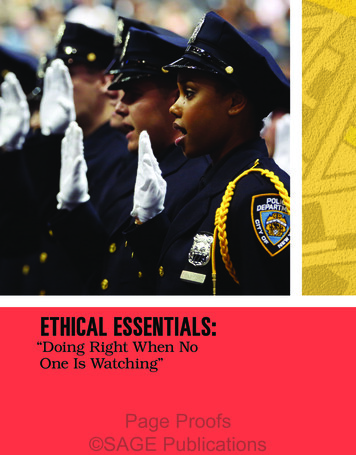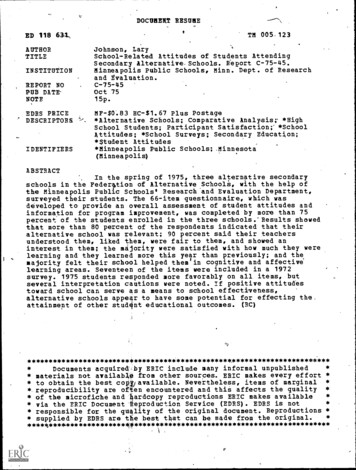
Transcription
VDOCUMENT RESUME4ED 118 631,TM 005.123PUB DATE-Johnson, LarySchool-Related Attitudes of Students AttendingSecondary Alternative-Schools. Report C-75-45.Minneapolis Public Schools, Minn. Dept. of Researchand Rvaluation.C-75-45Oct 75NOTE15p.EDRS PRICEDESCRIPTORSMF- 0.83 HC- 1.67 Plus Postage*Alternative Schools; Comparative Analysis; *HighSchool Students; Participant Satisfaction;' *SchoolAttitudes; *School Surveys; Secondary Education;*Student Attitudes*Minneapolis Public Schools; MinnesotaAUTHORTITLEINSTITUTIONREPORT NOIDENTIFIERS-(Minneapolis)ABSTRACTIn the spring of 1975, three alternative secondaryschools in the Federation of Alternative SchoolS, with the help ofthe Minneapolis Public Schools' Research and Evaluation Department,surveyed their students. The 66-item questionnaire, which wasdeveloped to provide an overall assessment of student attitudes andinformation for program improvement, was completed by more than 75percent of the students enrolled in the three schools.' Results showedthat more than 80 percent of the respondents indicated that theiralternative school was relevant; 90 percent said their teachersunderstood them, liked them, were fair to them, and showed aninterest in them; the majority were satisfied with how much they werelearning and they learned more this year than previously; and themajority felt their school helped them'in cognitive and affectivelearning areas. Seventeen of the items were included in a 1972survey. 1975 students responded more favorably on all items, butseveral interpretation cautions were noted. If positive attitudestoward school can serve as a means to school effectiveness,alternative schools appear to have some potential for effecting the,attainment of other stud4nt educational outcomes. ************************Documents acquired by ERIC include many informal unpublished* materials not available from other sources. ERIC makes every effort ** to obtain the best coptavailable. Nevertheless, items of marginal **. reproducibility are often encountered and this affects the quality *** of the microfiche and hardcopy reproductions ERIC makes available* via the ERIC Document Reproduction Service (EDRS). EDRS is not* responsible for the quality of the original document. Reproductions ** supplied by EDRS are the best that can be made from the ******************************
Minneapolis Public SchoolsSchool-Related Attitudes of StudentsAttending Secondary Alternative SchoolsLary JohnsonU S DEPARTMENT OF HEALTH.EDUCATION WELFARENATIONAL INSTITUTE OFEDUCATIONTHIS /DOCUMENT HAS BEEN REPRODUCED EXACTLY AS RECEIVED FROMTHE PERSON OR ORGANIZATION ORIGINATING IT POINTS OF VIEW OR OPINIONSSTATED DO NOT NECESSARILY REPRESENT OFFICIAL NATIONAL INSTITUTE OFEDUCATION POSITION OR POLICY013Ideas expressed in this report do not neabssarilyreflect the official position of the MinneapolisPublic School Administration nor the MinneapolisSchool BoardCN/T'.4(::)C:;)Research and Evaluation DepartmentPlanning and Support Services Division807 N. E. BroadwayMinneapolis, Minnesota 55413October 1975C-75-452
e41sfaMinneapolis Board of EducationW. Harry Davis, ChairmanRichard F. AlienMarilyn A. BorasCarol R. LindPhillip A. OlsonJane A. StarrJohn M. MasonInterim SuperintandsnIDonald D. Bevisspacial School District No. IMINNEAPOLIS PUBLIC SCHOOLSMINNEAPOLIS, MINNESOTAAn Equol Opportunity Employer
Minneapolis yublic SchoolsSchool-Related Attitudes of StudentsAttending Secondary Alternative SchoolsSummaryDo students like school? Do they feel that they are learning?view their teachers and their classes?ow do studentsIn the spring of 1975, three alternative secondary schools in the Federation ofsearch andAlternative Schools, with the help of the Minneapolis Public Schools'Evaluation Department, surveyed their students. The 66-item questionna re, whichwas developed to provide an overall assessment of student attitudes and informationfor program improvement, was completed by more than three - fourths of the\ studentsenrolled in the three schools.\.More than 80% of the responding, students felt that their alternat ve schooltaught them the things they wanted to learn, that most schoolwork would beew.useful to them, and that their classes applied to the world theyNinety percent of the respondents felt that their teachers underst od them,were fair to them, liXed them, and showed an interest in them. Two- hirdssaid'they would feel comfortable sharing personal concerns with the rteachers.The majority of the students said that they were satisfied with how Muchthey were learning and that they thought they learned more this year thanin previous years.About one-fourth of the students said their school helped "a lot" and halfimproving reading,said their school helped "some" in the following areas:math, and writing skills; developing skills useful in different jobs; increasing awareness of different careers.About 40r50% of the students said their alternative school helped them"a lot" and another 40-50% said their school helped them "some" in theselearning to get along with others, improving self-understanding,areas:improving decision-making skills.Seventeen of the questionnaire items were included in a survey conducted inMinneapolis senior high schools in May 1972. The alternative school students in1975 responded more favorably than did the public school students in 1972 on allSeveral interpretation cautions, such as the three-year difference betweenitems.the survey administrations, were noted.For example,Several important questions were not addressed by this study.what effect do alternative schools have on their students' feelings about themselves?Do alternative schools have an impact on their students' academic skills and theireventual success in, and satisfaction with, the adult world?Before any conclusions can be made about the effectiveness'of the Federationof Alternative Schools, further research is necessary. However, if positive attitudes toward school can serve as a means to the end, alternative schools appearto have some potential for effecting the attainment of other student educationaloutcomes.Research and Evaluation DepartmentOctober 1975ii
Table of ContentsPa eSummaryiiResults2Discussion8List of TablesTable No.12Attitudes Toward School Expressed by StudentsAttending Three Alternative Schools in May 19753A Comparison of Attitudes Toward ScI o1 Expressedby Students Attending Three Alternative Schoolsin May 1975 and Minneapolis Senior High Studentsin May 19728iiia
Minneapolis Public SchoolsSchool-Related Attitudes of StudentsAttending Secondary Alternative SchoolsDo students like School?Do they feel that they are learning?view their teachers and their classes?How do studentsDo they see themselves as capable learners?Student attitudes toward school is a popular topic in education.Ralph Tyler (1973)has stated that ".affective behavior is not only important as means to educationbut also as ends."If students like the school they attend, it seems reasonablethat their chances of success in school performance areas will be greater than ifthey felt the school environment were unpleasant.Affective behavioral outcomesfor students, such as positive feelings about themselves and other people, havebeen cited frequently by educators and lay people alike.Do students who attend alternative schools have positive school-related attitudes?Johnson and Faunce (1972a) surveyed) attitudes of senior high studentsattending non-public alternative schools in Minneapolis.Compared with perceptionsof their previous school, alternative schools were viewed by the students as providingmore positive and closer relationships with staff and other students, courses thatwere more interesting and easier to understand, more student input and freedom,more relevant curriculum, and more opportunities to improve basic skills.Assessment of affective student outcomes has continued at fOualternative schools in MinneapolissecondaryThe City Inc., the Center School, Loring-Nicollet, Northside Street Academy - with assistance from the Minneapolis PublicSchools (MPS)' Research and Evaluation Department.These schools fOrmed theFederation of Alternative Schools to obtain joint funding and resource supportfrom MPS to supplement their private and social-agency funding sources.TheMinneapolis school system provided more than 60,000 in instructional support andmaterials during the 1974-75 school year.Federation schools serve students whohave not been able to, or have not wanted to, function in public secondary schools.Many of the students are deficient in basic academic skills.Staff members from the Federation of Alternative Schools and the IMPS Researchand Evaluation Department developed a 66-item questionnaire that measured studentattitudes toward any specified school.1Federation staff members felt that infor-mation from the questionnaire would provide an overall assessment of student-1The work of Gail Brisbin (The City, Inc.), Mike Moschogianis (then Northside StreetAcademy), and Joe Munich (Loring-Nicollet) was indispensable to the conduct of thisstudy.
attitudes and data for program improvement.Some of the items were taken fromthe Student Opinion Questionnaire, an instrument developed by and used in the'Minneapolis school system.The items weregrouped in the following categoriesusing subjective judgment of similar content and previous statistical studies:curriculum relevance, general liking of school, student-teacher relationships,instructional quality, student input, individual freedom and responsibility,individuality of learning experiences, peer relationships, general progress inlearning and specific progress in learning.Seventy-eight percent of the total group of students attending three of thealternative schools in the Federation completed the attitude survey in the springof 1975; 52% of the students who were enrolled at The City, 80% of the studentsat Loring-Nicollet, and 98% of the students at the Northside Street Academy.Results for Loring-Nicollet, and particularly The City, should be interpretedwith caution since surveys were not returned by a substantial propoktion of theenrolled students.It is not known to what extent the responses of students whodid not complete questionnaires would have differed from the responses of studentswho completed questionnaires.ResultsThe following statements are based on the data presented in Table 1 on pages3-5 (School A is The City, School B is Loring-Nicollet, and School C is theNorthside Street Academy).Curriculum relevance (items 1-6).More than 80% of the responding studentsfelt that their alternative school taught them the things they wanted to learn,that most schoolwork would be useful to them, and that their classes applied tothe world they knew.About two-thirds of the students said that they were learninga lot of things that would help them earn a living.General liking of school (items 7-12).Three-fourths of the students indicatedthat they liked school; 89% agreed that they liked their classes, 75% said schoolwas fun, while 27% said they did not look forward to going to school.Student-teacher relationships (items 13-22).Ninety percent of the respondentsfelt that their teachers understood them, were fair to them, liked them,,and showedan interest in them.The majority of the students also felt a personal relation-ship with their tdachers,65% said that they would feel comfortable sharing
Attitudon Toward School Expressed by StudentsAttending Three Alternative Schools in May ulum Rolovance1. Thio ochoOlteaches mo thethings I want toloarn2. School d000n'tteach the moreimportant thingsin 7075SA4354A7527D6332SD26SA4ResponseI liko myclassesTotalC0N39 N12%N 28N 37SA32%16%A54817873D1131510SDI don't lookforward to goingto 2182659133004312.Student TeacherRolationohipo3. The work I do inochool is notworthwhile--4. Moot schoolworkwill be uooful to'111"-me when I got outof school5. Clacoeo in thinochool do notapply to thoworld I know6.I am learning alot of thing that will holpmo to oars 522:in1814812A,64535054DSD113135287386Gonoral Liking ofSchool7.I liko ochool9.think ochoolin funI0. My classes area challongingexperience21%15.16.SAStrongly Agree, 372D03169SD0042I would feelcomfortableoharing poroonalconcerno with myteacher SA2135518A43574247D2584228SD110118It io hard forme to know whatmy toachero areroally liko aopersonsSA4I think mytoachorn understand me17. My toacheroohow an interootin 1218SA18. My toachoro arefair in theirdealing with MP153019. Moot of mytouchers seemto like D7096SA0000SA1914511A48585860D22253328SD1134520. My Coacher donot lioton towhat / have toGay School N, The City; School 0, Loring-Nicollet; School C, Northnide Street Academy.b44SA21%ODO. My claosooaro boring7%13. My toachero aronot honoot intholr dealingswith meAgree, DDioagroo, SDStrongly DisagreeA00157D64517465SD36491129
Table 1 (continued) School Attitudes of Alternative School StudentsSchoolResponseItem21. I like most ofmy A7002A731911D54596962SD3230132532. I feel that Ihave too muchresponsibilityac a ctudZnt33. Someone is always. ebreathing downmy neck in thisochool58%A38/DSD24. Teachers in thisochool do a poorjob25. I can get helpfrom my teacherswith my ochoolwork26. My teachers givema enough background and informotion to completemy school work27. Many times I amnot clear aboutwhat the teacherexpects me to dent Input20.29.I have somepower in decidinghow the ochool is3A25%24tA46655958runD25112721OD40116OA7043I have little toGay about the%clasoos 450OD3349183131. Many timesstudents are givena chance to decidewhat their 152434. I cannot make adocioion about mywork activitioowithout my teacher'o approvalSA35. I have a lot offreedom to choosewhat I want tootudy36. Thio ochool allowomo to work at myown dividuality ofLearning Experienced37. I can uouallychap my-elm:mooto my own otyloof doing thingo30. There is littleroom to expr000myoolf in thework I do15%Ar-d1;16.30. My teachers arenot willing tolisten tosuggestions fromstudentsa4%SAAInstructional QualitySATotalC13Individual Freedomand Responsibility023. Teachers at thisochool roallyooem to enjoyteachingSchoolResponseA71SD22. toot of myChachers arenot considerateof ho 4 studentsTotal39. Thio ochool givoome a chance todevelop my specialokillo and 2317SD0052Peer Relationships40.I have come goodfriends in ochool41. Some students inthio school aronot considerateof my feolingo42. Students in thisschool seem tolike 5743D40513744OD151420OA1917612A77818883D03643D4001
Table 1 (continued) School Attitudes of Alternative School StudentsSchoolResponseItemA43. Some students inthis ochool areoarcastic andcritical of otherstudentsSA44. Students in thisschool listen toono another45.I feel uncomfortablo in thinschool04%5A33646356D48253032SD11646SA2622615A Lot44%32%16%20%Some4441705511271418A Lot56271829Some33355745Whg.11382526.A Lot41722744Some4H2855451101011A Lot41162024Some48574951WhI611273125-A Lot56782749Some37225239Whgo702112A Lot46%783050Some4422504470117A Lot26492733Soma59465252little1552115More Spocific Progresoin Learning766568D732614SD4043SA1155754. Improving myrending okilloLitA1451713D4338574851213355. Improving mymath okillo56, Improving myundorotandingof myself.14,t1lge46. Students in thisochool aro notvery friondly47. Students in thisochool are nothonoot with eachothor40. Studento in thioochool sharetheir Peelingswith one 2SD49.I would feelcomfortable charing my personalconcerns withothor otudento inthis ochool0SA1128212A54644050D3204732SD57. Learning aboutdifferentcarooro andjob358. Learning howto got alongwith othorpeople59. Learning hawto communicatewith otherpeople60. Becoming awareof what I wantto do after Ileave 255(.42235in thirk ochool51.52.I am satisfiedwith how muchI am learningI fool that I'mdoing enough aoa student.GA13675357D71935243D7376GA25114- 11615154554A00'SDI think I learnedmore this yearthan in previousyodra554AD53.1132SAADOD114-3052.63. Dovolopingskill thatwill ho usefulfor difforont32393154443024494347190372300125jobsSome- . 70:66 Improving myability to makedoclaiono.1 05Ill.-,tdd .'.0. :65, u.:21'5911,1.9252041 Lot56702940Gomm,302759431531310U 12.14252459- 50465372829244859224041416250Whgo1101610A Lot3770,2341SomeA LotSomeWell.A Lot64. Improving myoolf-confidenco65. Reaping an openmind G boing indopondont of theopinions ofother students.-.4rit-WhlirbI don't think Iam learning much,:24P '-i'.-- ,1./4.,.!'.x662. 3o riming morerooponoiblofor my bohavforrA Lot61. Improving mywriting okilloGenoral Progreos inLearning50.Cfollowing area!).63326Indicato how much ochool haohelped you in oath of 48Lithge1131711A Lot59733151Somo30274436Whg.1102414"
personal concerns with their teachers, and 80% reported that it was not hard toknow what their teachers.were really like as persons.The students at school B(Loring-Nicollet) had particularly favorable views of student-teacher relationships;Instructional quality (items 23-27).The quality of instruction at the al-ternative schools received very favorable ratings by the students.More thanninety percent of the students said that the teachers really seemed to enjoy teaching, that the students could get help from their teachers with their schoolwork, andthat the teachers did not do a poor job.However, 39% of the students indicatedthat many times they were not clear about what the teacher expected them to do.This lack of clear expections was reported by 55% of the students at the NorthsideStreet Academy (school C).Student input and responsibility (items 28-36).Eighty-to-ninety percentof the otudents said that students were given input into their classes, that teacher were willing to listen to their suggestions, that student had a lot of freedomto ch000e what they wantecPto study, and that sthool allowed them to work at theirown opeed.About three-fourtho of the students said that they had some power indeciding how the school was run.'Individuality of learning experiences (items 37-39).A large majority ofthe respondents (about 80%) indicated that they could usually shape their clausesto their own style of doing things and that their school gave them a chance toexpress themselves.In general, students reported positivePeer relationshipa (item 40-49).relationohipo among the students attending alternative schools.About 90% of therespondents agreed that otudents in their school seemed to like them, agreed thatstudent listened to one another, and disagreed that student were not very friendly.More students at ochoolo A and B, than student at school C, indicated that theyrelated to each other on a personal level.About 90% of the otud
3-5 (School A is The City, School B is Loring-Nicollet, and School C is the Northside Street Academy). Curriculum relevance (items 1-6). More than 80% of the responding students felt that their alternative school taught them the things they wanted to learn, that most schoolwork would be
